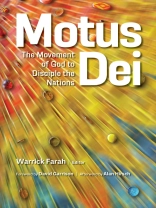Discover Your Place in the Movement of God
An incredible breakthrough in missions history is taking place as disciples of Jesus make more disciples of Jesus around the globe, particularly among the least-reached. But what exactly are these church planting or disciple making movements? Where are they occurring and what are their unifying features? How are they manifesting in diverse populations? And can you or your organization be instrumental in catalyzing more movements? Motus Dei, Latin for “movement of God, ” seeks to answer these questions and more.
Warrick Farah has expertly synthesized an extensive conversation between mission practitioners, scholars, and seasoned movement leaders from around the world. The resulting in-depth analysis of movements provides a multi-disciplinary, academic investigation of an emerging “movements missiology, ” highlighting the importance of theology, social sciences, ethnology and anthropology, communications theory, leadership theory, and statistical analysis. Motus Dei locates the current Church Planting Movement (CPM) phenomenon within modern history, while tracing its roots back to the first century, and articulates a missiological description of the dynamics of Disciple Making Movements (DMMs) in Asia, Africa, and diaspora contexts in the Global North.
Offering over thirty firsthand accounts of indigenous churches planting churches among the nations, Motus Dei provides a seedbed for growing movements in diverse contexts. There are lessons to be learned here by anyone seeking to participate in the movement of God.
Inhaltsverzeichnis
Dedication
Illustrations
Tables
Foreword
Acknowledgements
Introducing Motus Dei
Abbreviations
Part I — The Big Picture of Movements
Chapter 1 — Movements Today: A Primer from Multiple Perspectives
Chapter 2 — Observations Over Fifteen Years of Disciple Making Movements
Chapter 3 — Addressing Theological and Missiological Objections to CPM/DMM
Chapter 4 — How Exactly Do We Know What We Know about Kingdom Movements?
Chapter 5 — How Movements Count
Part II — Missional Theology of Movements
Chapter 6 — A Biblical Missiology of Kingdomization through Disciple Multiplication Movements of House Church Networks
Chapter 7 —The Word Spread through the Whole Region: Acts and church planting movements
Chapter 8 — God’s Expanding Family: The Social Architecture of Ekklesia Movements
Chapter 9 — John’s Missiological Theology: The Contribution of the Forth Gospel to the First-Century Movement in Roman Asia
Chapter 10 — Households of Peace: Relationships, Boundaries, and the Gospel
Part III — Movement Dynamics
Chapter 11 — Why Movements Rise and Fall
Chapter 12 — From Her Perspective: Women and Multiplication Movements
Chapter 13 — How Ethnodoxology Drives Movements
Chapter 14 — Media to Movements: A church planting Fusion
Chapter 15 — Terra Nova: Opportunities of Movement Work in Diaspora Contexts
Part IV — Case Studies
Chapter 16 — The Way of Life: Transference of Spiritual DNS within Movements in East Africa
Chapter 17 — Bhojpuri Case Study
Chapter 18 — A Thai Multiplication Movement
Chapter 19 — Movements in Iran and Algeria: The Second-Generation Challenge
Part V — Movement Leadership and Next Steps
Chapter 20 — The Profile of an Effective Movement Catalyst
Chapter 21 — Pursuing Movements: An Organizational Paradigm Shift
Chapter 22 — Maturing the Missiological Discourse on Discipleship Movements
Afterword
Contributors
Index
Über den Autor
Dr. Warrick Farah serves with One Collective as a missiologist and theological educator. He is editor of Motus Dei: The Movement of God to Disciple the Nations (2021) as well as co-editor of Margins of Islam: Ministry in Diverse Muslim Contexts (2018). His research interests include Muslim Studies, Frontier Missiology, Integral Mission, and Church Planting Movements. He has published in journals such as EMQ, Missiology, IJFM, Global Missiology, and the Great Commission Research Journal. Warrick is the founder and a facilitator of the Motus Dei Network (https://Motus Dei.Network) and is a researcher at the Oxford Centre for Mission Studies.







![Cover von Brian Schrag & Julisa Rowe: Community Arts for God's Purposes [Chinese] 貼近神心意的社群藝術 Cover von Brian Schrag & Julisa Rowe: Community Arts for God's Purposes [Chinese] 貼近神心意的社群藝術](https://static.worldofdigitals.com/thumb_webp/740/9781645083740.webp)




